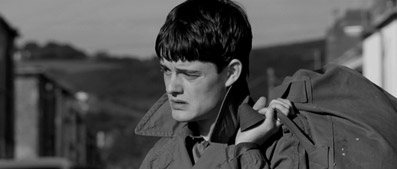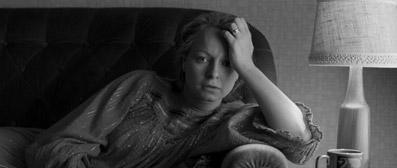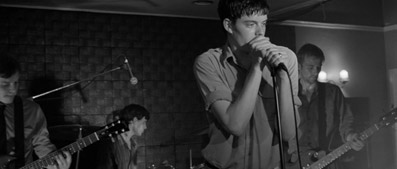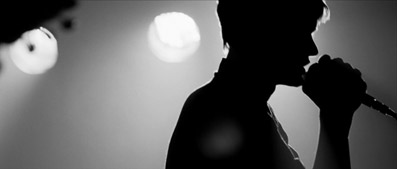I wish I were a Warhol silk screen
Hanging on the wall
Or little Joe or maybe Lou
I'd love to be them all
All New York city's broken hearts
And secrets would be mine
I'd put you on a movie reel
And that would be just fine. |
St Valentine's Day poem
From Ian to Debbie, 1973 |
Taken from Touching From a Distance (1995) by Deborah Curtis,
later spoken in voiceover by actor Sam Riley in the film Control |
Reading about Control and any article worth researching about Joy Division, it becomes clear that the current generation of film journalists are of the right age to have been impacted by the band and the subsequent musical revolution that followed first hand. Many of the best writings unsurprisingly come from people who knew the band personally. In order to afford the reader an idea of this particular reviewer's difference of perspective it is necessary to state that I was not even born when the true events of this biopic unfolded. For that reason I cannot look back with nostalgia at the time, and therefore don't have that bias. Yet I am a huge Joy Division fan and went though a certain period of adolescence as an Ian Curtis fanatic, so it is for this reason that I see myself equally qualified to discuss the subject matter. In fact I believed there had not been enough interest in Joy Division from people of my age group until the recent post-punk revival with such bands as Editors, Interpol, Bloc Party and Maximo Park, who all contain at least a hint of JD's sound.

With the release of Michael Winterbottom's 24 Hour Party People in 2002, the Ian Curtis story was made more accessible, although only as a part of a broader story, and it was at this time his band's music enjoyed the beginning of resurgence (even though they never really disappeared from musical consciousness). Also the late, great Tony Wilson, after feeling somewhat hard done by in Winterbottom's portrayal of his character and his bands, was hankering after a more serious look at the time and events surrounding Curtis's suicide. The obvious place to look was Ian's wife Deborah's fantastic 1995 insider biography, Touching From a Distance.
I remember reading Deborah's book at the height of my Curtis obsession and being totally captivated by its frankness and honesty, in spite of her obvious emotional intimacy with the subject matter. One of the reasons I chose the poem above to start this review was because it reflects the awe and admiration I was experiencing when reading the book. I feel a certain affinity with Ian via this poem and the sentiment it conveys, plus I was about the same age reading it as he was writing it.
So, when word was out about a film in discussion using this material I was filled with my usual mixed feelings of excitement and apprehension in seeing a book I love coming to the screen, doubled by the fact it would also be about a band that I greatly admired. Fears were eased on hearing Tony Wilson, Debbie Curtis and Peter Hook were involved in the meticulous casting, and more so in the knowledge that NME and Joy Division photographer Anton Corbijn would be directing.
For those not familiar with the story, it is a simple one; an intelligent and ambitious young man marries his high school sweetheart at a very young age and when he becomes the lead singer of a successful band he finds it difficult to equate the responsibilities of family life and a rock and roll lifestyle. Matters are made more complicated for him with the arrival of a daughter and then the onset of epilepsy. Falling in love with a beautiful Belgian journalist, his confusion tears him apart, as well as the demands made upon him as the band become more well known. A fragile mind and a sensitive soul fighting with an unpredictable body are brought to breaking point on the eve of his band's first American tour, and Ian Curtis at the age of 23 commits suicide.

Corbijn's film works well for many reasons but above all it is not a 'music film'. It could have easily over put the emphasis on the band, but where the heart of the story lies is in the tender tragedy of failed love between Ian and Debbie, from their naïve schooldays to the final catalyst of his affair with journalist Annik Honoré at the height of his band's success. All three of these roles are played with great subtlety and empathy – Alexandra Marie Lara as Annik is stunning and comparatively exotic juxtaposed to the shy, mumsy and mousy housewife of Debbie, heartbreakingly played by the fantastic Samantha Morton. But the film rests on the shoulders of the man to play Joy Division and Control's poster boy: Ian Curtis. That falls to the unknown Sam Riley, and they could not have gone to a better actor. Riley eerily embodies Curtis, from that little-boy-lost look to his 'dying butterfly dance' onstage and even to his singing. Deborah Curtis was reputably rigorous in finding the correct man to play her Ian, and that has paid strong dividends. There is not a touch of tangible impersonation in Riley's portrayal– he is Ian.
But, obviously, to deny the film Joy Division would be in the very least untrue to Ian's life and love. The band are, of course, a large feature of the film, and the casting had to be right. What is most brilliant about the offstage Joy Division scenes is the casualness and Northern modesty the whole cast provide. They are totally believable as a young band starting out, each one embodying their character perfectly. Newcomers James Anthony Pearson as Bernard Sumner and Joe Anderson as Peter Hook are both wonderful – Anderson as the wry comedian of the group gets the most laughs – and Harry Treadaway who impressed me greatly in Brothers of the Head (2005) is good in a less major role and does Morris's drumming proud in the live scenes (more on those later). But the most impressive of the supporting cast for me is Toby Kebbell as bolshy manager Rob Gretton, a pole away from an equally great performance in Dead Man's Shoes (2004). The only performance that stood out as at all unconvincing was Craig Parkinson as Tony Wilson. It is always an immense undertaking to play someone of great charisma and not overdo it, and in an effort to be in keeping with the low key performances uniform to the rest of the cast, Parkinson's Wilson comes across as a rather fey and unimposing character. Whatever Coogan's Wilson was in 24 Hour Party People it was a lot more effective.
Moving away from performance, in the managing of this story, credit is due to screenwriter Matt Greenhalgh and Corbijn directs his first feature film with unerring confidence. One of the best qualified people to tell this particular story and a man with the artistic eye to create still photographs that have become iconic, it comes as no surprise that Corbijn navigates the tone set up in the script wonderfully. His evocative black-and-white style translates well to the moving image, and can be beautifully poetic in its formal compositions yet also at times bring to mind the gritty 'kitchen sink' realism of work such as Loach's Cathy Come Home (1966). The pacing of the film is as ponderous as its protagonist who spends much of the film a lone figure in his suburban landscape, wandering from place to place, work to home, etc. This not only shows Curtis's isolation, both mentally and physically, but serves to cement the sense of place so key to understanding the man. Both of these elements are overriding themes in his Joy Division lyrics. The choice of songs to put in the film will be obvious to fans, but what is so incredible is coupling their music with the images of Macclesfield reinforces the bleak brilliance of their sound in a way that seems inevitably natural.

With authenticity a top priority in Control there seemed no other way to film the live music scenes than as real live footage (as it turns out this was a decision made practically on set due to the proficiency of the actors music practises). Therefore all actors play their own instruments and Riley sings himself. The effect is not just believability but total conviction, with no effort spared in getting them to sound just like the real band. This just adds to the resounding honesty of the film, which reflects the sentiment of the book it is based upon.
If I have one major criticism of Control it is that Riley's portrayal of Curtis is possibly a tad over-sympathetic. The book paints a still-darker character than depicted in the film and his violent temperament and sometimes cruel nature are all but nonexistent in this picture, I would guess for the audience to really identify and ultimately sympathize with him. Don't get me wrong, one can easily sympathize with certain aspects of his struggles, but I believe there is a little too much innocence in the screen Ian. But as I said earlier, I was not around at the time so it is mere speculation based on Debbie's book and other sources. This is no disaster for the movie though, as pains were obviously taken to tell as true a story as necessary.
Once finally in the cinema watching this film it was like the end of a long journey. There is something final about Control when it comes to the Joy Division legacy, and with the recent disbandment of New Order there is now nothing new that was directly touched by the myth of Ian Curtis. It is with the release of this biopic that I like to think that he will be left to rest in peace, after dispelling much rumour of the character of one modern music's most poignant of tragedies.
This is one of the rarest and most brilliant of biograghical films, one that strives for honesty over all else, and for that deserves high praise. But what it also does is tell a tender and truly tragic tale of love tearing one idealistic young man apart, and what can be more brutally honest than that?
The pristine anamorphic 2.35:1 transfer fully captures the monochrome beauty of Martin Ruhe's fabulous scope cinematography, itself at times like a moving recreation of Corbijn's own iconic photographs of the band and the period. The slight grain evident is exactly how the film looked in the cinema and feels completely appropriate to the photographic style. Apparently Ruhe shot on colour stock and printed in black and white because the monochrome film tests were "so grainy it looked like Super-8 even in 35 millimeter."*

There are three soundtracks on offer, Dolby stereo 2.0, Dolby 5.1 surround and DTS surround. You'd expect the surround tracks to be superior to the stereo track, at least when it cam to the live performances, and in the case of the DTS track that's true. What's surprising is how lacking in volume and punch the 5.1 track is by comparison to the DTS, playing suspiciously like the stereo track has simply be run through an ACC encoder. The DTS track really is the only was to go here, with the live performances in particular having all the clarity, power and thumbing bass of, well, a live performance.
A disappointingly slender package, especially in comparison to Michael Winterbottom's packed Party People DVD, but there are a few nice features. The best of the bunch is Anton Corbijn's insightful director's commentary, where he covers much of the more fascinating details of the production as well as his directorial motivations. Personally I found his Dutch accent made some of his more mumbling moments a little difficult to decipher, but that's probably more a case of a problem with my own live music damaged hearing than anything else!
The Making of Control featurette (23:18) is interesting enough, with interviews with director and writer, but unfortunately lacks anything from the people the film is actually about. A contribution from Debbie Curtis or one of New Order would have been really nice, but alas they are notable by their absence on these extras.
The live Extended Performances (7:48) of the songs featured in the film are an unusual and appealing addition, as we get to see how well the songs are performed by the cast in their entirety.
It's nice to see Corbijn's 1988 Atmosphere music video (4:34) as a feature, an evocative and important part of the Joy Division commercial postmortem. There is not much here that shows the cinematic flare used in Control, although his black-and-white iconography is as ever prevalent. This extra is more of a nostalgic relic than anything else.
To end the collection we have a pretty average photo gallery – most pictures I had seen previously in press releases.
Finally the obligatory trailer (1:46), which is ample for its purpose and evokes a good sense of the film and its tone but no work of stand out art in its own right, unsurprisingly.
All in all, a quite beautiful film but not quite such a grand set of special features to go with it. It is a film that any fan of British music, let alone British cinema should own though. Maybe a special edition will grace the shelves in the not too distant future?
* Anton Corbijn in an interview with Shelley Leopold in LA Times, October 17, 2007.
|